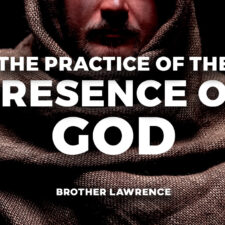A critical part of spiritual maturity is developing the ability to hear the voice of God. Without it, the believer becomes part of the herd, following others who are following others. The uniqueness of each relationship with God requires the Christian to hear the gentle whisper (still small voice – 1 Kings 19:12) as He leads, directs, guides, teaches, encourages, corrects, and convicts each one who desires to know God intimately. This ability does not happen by accident, but begins with the believer recognizing that hearing the quietness of His whispers is the by-product of knowing one’s identity as a child of God. In Psalm 46:10, “Be still, and know that I am God; I will be exalted among the nations, I will be exalted in the earth!”
In John 6:45, “It is written in the prophets, ‘AND THEY SHALL ALL BE TAUGHT OF GOD.’ Everyone who has heard and learned from the Father, comes to Me.” Jesus was teaching His disciples that to be a learner, the very meaning of being a disciple, requires the ability to hear from God, and that this is the avenue for a deeper relationship with Him. God wanted the Jews to understand that they must be taught His ways, the avenue that allows each to walk in His paths. In reference to the future kingdom age, Isaiah said, “And many peoples will come and say, ‘Come, let us go up to the mountain of the Lord, to the house of the God of Jacob; that He may teach us concerning His ways and that we may walk in His paths.’ For the law will go forth from Zion and the word of the Lord from Jerusalem” (Isaiah 2:3). To hear the voice of God in the new covenant ages, both church age and kingdom age, the believer must listen to the Messiah, Jesus Christ. In Matthew 17:5, the Father spoke to Peter, James & John on the Mount of Transfiguration, “This is My beloved Son, with whom I am well-pleased; listen to Him!”
False Teachers
In John 10:1, Jesus speaks of a door that one must enter into the sheepfold to be considered the shepherd and not some thief or robber. The reference is to false teachers, who set themselves up to the Jewish people as rabbis and prophets, but cannot hear from God and are not the true teachers. The Lord warned about these false teachers in Jeremiah 23: 1-2, “’Woe to the shepherds who are destroying and scattering the sheep of My pasture!’ declares the Lord. Therefore thus says the Lord God of Israel concerning the shepherds who are tending My people: ‘You have scattered My flock and driven them away, and have not attended to them; behold, I am about to attend to you for the evil of your deeds,’ declares the Lord”. The greatest enemy of the believer comes from within the church and not from without. Jesus is identifying the scribes and Pharisees as false teachers, having attained their positions through means other than recognition of, faith in, and reliance upon Messiah (John 10:26). The door of the sheepfold is a door of mercy and not just the occupation of high ecclesiastical office. It is the result of a heavenly commission, like the prophet in Jeremiah 1:5 “Before I formed you in the womb I knew you, and before you were born I consecrated you; I have appointed you a prophet to the nations.” The new covenant commentary on this is found in Ephesians 4:11, where Paul identifies those that God has gifted for ministry.
Like the Pharisees within the Jewish faith, Paul identifies this same phenomenon within the church as a work of Satan to destroy its foundation through false teaching and human accomplishment as opposed to the work of God in and through the believer. They make themselves look and sound like apostles of Christ, but they are really wolves in sheep’s clothing (Matthew 7:15). This has always been Satan’s strategy, to counterfeit the goodness of God in order to destroy the work of God from within. In John 10:10, “The thief comes only to steal and kill and destroy”. These servants of the devil disguise themselves as “servants of righteousness”, yet they rely on man’s work and will be judged by that work (Revelation 20:12). The fullness of this work of Satan is seen in the anti-Christ, the lawless one, who is prophesied to come in the near future in Paul’s second letter to the Thessalonians.
The Voice of the Good Shepherd
The ability of the believer to be led by God is directly related to his ability to hear and respond to the voice of God. According to John 10, the shepherd speaks and the sheep recognize the voice. It is the voice of the Good Shepherd, speaking to each believer and through the pastor with the heart of God (Jeremiah 3:15), feeding the people of God on knowledge and understanding. As Elijah arrived at Mount Horeb, the same area Moses had heard from God on Mount Sinai many years earlier, Scriptures reveal in 1 Kings 19:11-12 that God would not speak with him through wind, an earthquake, or a fire (the signs of God’s judgment), but the sound of a gentle whisper (still small voice in KJV). He was teaching the people of God that He will speak in quiet whispers and not an audible voice that all can hear. God wishes His people to develop an ability to hear His voice as He speaks in the quietness of the details of life and not by the fire and brimstone through which He had been known.
To hear the voice of the Good Shepherd, the believer must recognize His authority just as the sheep recognizes the authority of the shepherd. The shepherd has demonstrated His willingness to lay His life down for the sheep and therefore can be trusted in everything. His voice is reliable and is able to fulfill every promise He makes. In Psalm 29:4-5, “The voice of the Lord is powerful, the voice of the Lord is majestic. The voice of the Lord breaks the cedars; yes, the Lord breaks in pieces the cedars of Lebanon.” The new covenant believer learns to trust His voice since He always speaks the truth and wishes to lead the flock in safe places.
The Shepherd and the Sheep
The 23rd Psalm may be the most recognizable passage of Scripture. It speaks of the relationship between the shepherd and the sheep (believer) and the work of the shepherd in the believer’s life. It is undeniable that Jesus had this passage in mind when he spoke of the shepherd and sheep in John 10. The Psalm gives the believer great insight into the profound relationship that exists between shepherd and believer creating the confidence of the believer that, when the Lord is my shepherd, I shall not want (I shall want of nothing). It speaks of the commitment that the Lord has to the believer in all points of life, including the very face of death. Recognizing the full commitment that the Lord has in the believer’s life is foundational to listening and hearing the Lord as He leads the believer through the details and challenges of life. When the Lord speaks, He speaks with full authority and the believer can expect that what He promises, He is also able to do and will do (Ephesians 3:20).
Believers are Doers
46 “Why do you call Me, ‘Lord, Lord,’ and do not do what I say? 47 Everyone who comes to Me and hears My words and acts on them, I will show you whom he is like: 48 he is like a man building a house, who dug deep and laid a foundation on the rock; and when a flood occurred, the torrent burst against that house and could not shake it, because it had been well built. 49 But the one who has heard and has not acted accordingly, is like a man who built a house on the ground without any foundation; and the torrent burst against it and immediately it collapsed, and the ruin of that house was great.” (Luke 6:46-49)
Once the voice of God is heard, it becomes necessary for the believer to act on that voice. Jesus’s brother, James warns us that faith without works is dead (James 2:17). The very foundation of faith is a willingness to act, to do what God has commanded. In James 1:22-24, “But prove yourselves doers of the word, and not merely hearers who delude themselves. For if anyone is a hearer of the word and not a doer, he is like a man who looks at his natural face in a mirror, for once he has looked at himself and gone away, he has immediately forgotten what kind of person he was.” The confidence the believer has in his own faith in who Jesus is and what He accomplished is directly related to his conviction to act on what he has heard.
The Bible Still Speaks
Thirty-six years ago, I was invited to a Bible study at an elementary school in Framingham, MA by a business friend. That night was the beginning of a long relationship I’ve had with the ministry now known as Greater Grace World Outreach. The name of the ministry at the time was “The Bible Speaks”. That’s kind of a strange name; ministries do not usually have a verb in their name! But as I listened more and more to Pastor Carl Stevens teach, his ability to quote Scripture, and speak truth to my heart, the name made a lot of sense. The Bible does speak and I was hearing that certain sound.
Since that initial experience, I have recognized God’s call on my life to go to Bible college and become ordained as a pastor in this ministry. This journey has included a series of major challenges of life that seemed to accompany the things I was being taught in the classroom. God was bringing to life the Biblical truths I was now learning and to accept them as true, not just theologically, but personally. It has taken the extended classroom of the details of my life to make them real in a personal sense. Through this process, the Word of God comes alive and I am now able to hear Him personally speak to me through the thoughts that he whispers to my spirit. No longer are they idle thoughts, but his voice is directing me in the details of life by the Holy Spirit. In Romans 10:17, the Bible says, “So faith comes from hearing, and hearing by the word (rhema) of Christ”.
The public ministry of Jesus centered on His teaching the masses and the twelve. As the mediator of a new covenant, He was bringing new understanding to the Scriptures as He revealed Himself as the Messiah, the Son of God. The Jewish leadership of His day completely rejected His claim to deity and therefore all of His words. There is a great picture of this process in Mark 2:1-12. A paralytic is lowered into a crowded room where Jesus was teaching, looking for a healing. Jesus observed the effort of the four men to get that paralytic before Jesus and told the man his sins were forgiven. The reaction of the scribes in the room was predictable, accusing Jesus of blasphemy. To confirm the authority of His words, Jesus said to the paralytic, “I say to you, get up, pick up your pallet and go home” after healing him. When the hearer recognizes the authority of the word written or spoken, it has supernatural power. Paul observed this attitude with believers in 1 Thessalonians 2:13, that they received the word spoken from the pulpit as if God spoke it directly.
God promised the Jews that they would walk in His ways and it would be well with them if they would, “obey My voice, and I will be your God and you will be My people”. Both the Hebrew and Greek words translated obey have the basic meaning of ‘listening closely with the intention to obey”. When the Jews did not incline their ear to God’s words, they went backwards (Jeremiah 7:23-24). This principle holds just as true for the New Testament believer as well.
In the church age, believers have the distinct advantage of living in a new covenant, secured by the completed work of Christ on Calvary’s cross. We also enjoy access to the full canon of Scripture which affords us a deeper understanding of the character and nature of God through the doctrines addressed and further defined in both the Old and New Testament. In 2Timothy 3:16, Paul addresses all Scripture as “inspired by God and profitable for doctrine, for reproof, for correction, for training in righteousness”. The study of Scripture doctrinally (teaching by category) brings the believer into a more in-depth comprehension of His thoughts on a particular subject. This approach to the Word of God has always been a framework of our ministry in bringing believers to hear His voice.
One of the verses regularly emphasized by our founding pastor is 2 Timothy 2:15, “Be diligent [spoudazo – to make every effort to do one’s best] to present yourself approved to God as a workman who does not need to be ashamed, accurately [correctly] handling the word of truth”. The fulfillment of God’s life in each believer is related to diligence and a willingness to pursue, to seek after truth and attention to accuracy is a critical part of the process.
In Deuteronomy 5:24, Moses says, “Behold, the Lord our God has shown us His glory and His greatness, and we have heard His voice from the midst of the fire; we have seen today that God speaks with man, yet he lives”. The reference is to Moses hearing the voice of God from Mount Sinai and receiving the Law in Exodus 20, but it also speaks to His voice in the midst of the fires of man’s living experiences – and he still lives. To hear the voice of God is to recognize His greatness and glory.













